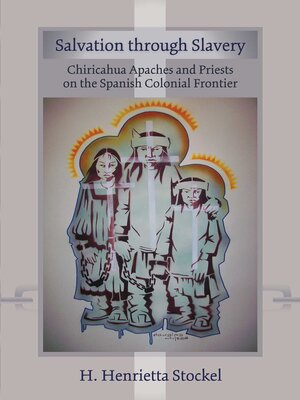Salvation Through Slavery
ebook ∣ Chiricahua Apaches and Priests on the Spanish Colonial Frontier
By H. Henrietta Stockel

Sign up to save your library
With an OverDrive account, you can save your favorite libraries for at-a-glance information about availability. Find out more about OverDrive accounts.
Find this title in Libby, the library reading app by OverDrive.



Search for a digital library with this title
Title found at these libraries:
| Library Name | Distance |
|---|---|
| Loading... |
In her latest work, H. Henrietta Stockel examines the collision of the ethnocentric Spanish missionaries and the Chiricahua Apaches, including the resulting identity theft through Christian baptism, and the even more destructive creation of a local slave trade. The new information provided in this study offers a sample of the total unknown number of baptized Chiricahua men, women, and children who were sold into slavery by Jesuits and Franciscans. Stockel provides the identity of the priests as well as the names of the purchasers, often identified as Godfather.
Stockel also explores Jesuit and Franciscan attempts to maintain their missions on New Spain's northern frontier during the seventeenth and eighteenth centuries. She focuses on how international political and economic forces shaped the determination of the priests to mold the Apaches into Christians and tax-paying citizens of the Empire. Diseases, warfare, interpersonal relations, and an overwhelming number of surrendered Chiricahuas at the missions, along with reduced supplies from Mexico City, forced the missionaries to use every means to continue their efforts at conversion, including deporting the Apaches to Cuba and selling others to Christian families on the colonial frontier.
Stockel also explores Jesuit and Franciscan attempts to maintain their missions on New Spain's northern frontier during the seventeenth and eighteenth centuries. She focuses on how international political and economic forces shaped the determination of the priests to mold the Apaches into Christians and tax-paying citizens of the Empire. Diseases, warfare, interpersonal relations, and an overwhelming number of surrendered Chiricahuas at the missions, along with reduced supplies from Mexico City, forced the missionaries to use every means to continue their efforts at conversion, including deporting the Apaches to Cuba and selling others to Christian families on the colonial frontier.







